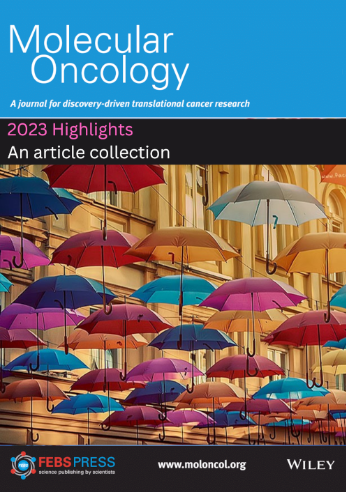间充质肿瘤细胞驱动Trp53−/−乳腺肿瘤细胞对失活突变Kras的适应性抵抗
IF 5
2区 医学
Q1 ONCOLOGY
引用次数: 1
摘要
随着精准医学提高治疗的有效率,肿瘤经常绕过抑制,复发。为了使治疗长期有效,需要了解使治疗适应的机制。在这里,我们报道了一种小鼠模型,该模型在缺乏p53和致癌KrasG12D的情况下,发展为乳腺肿瘤。在KrasG12D失活后,肿瘤最初消退并进入缓解期。随后,大多数肿瘤适应于KrasG12D表达的撤回并返回。KrasG12D非依赖性肿瘤细胞表现出强大的间充质特征,具有活性的RAS‐RAF‐MEK‐ERK(MAPK/ERK)信号传导。KrasG12D依赖性和KrasG12D-非依赖性肿瘤都表现出高度的基因组不稳定性,并且KrasG11D-非依赖型肿瘤携带许多可以激活MAPK/ERK信号通路的扩增基因。我们的研究在一个新的Trp53−/-乳腺癌症小鼠模型中确定了适应致癌KrasG12D退出的肿瘤中的上皮-间质转化(EMT)和活性MAPK/ERK信号传导。为了在临床上实现对RAS引发的癌症的长期反应,治疗需要同时关注阻止肿瘤适应癌基因抑制。本文章由计算机程序翻译,如有差异,请以英文原文为准。
Mesenchymal tumor cells drive adaptive resistance of Trp53−/− breast tumor cells to inactivated mutant Kras
As precision medicine increases the response rate of treatment, tumors frequently bypass inhibition, and reoccur. In order for treatment to be effective long term, the mechanisms enabling treatment adaptation need to be understood. Here, we report a mouse model that, in the absence of p53 and the presence of oncogenic KrasG12D, develops breast tumors. Upon inactivation of KrasG12D, tumors initially regress and enter remission. Subsequently, the majority of tumors adapt to the withdrawal of KrasG12D expression and return. KrasG12D‐independent tumor cells show a strong mesenchymal profile with active RAS‐RAF‐MEK‐ERK (MAPK/ERK) signaling. Both KrasG12D‐dependent and KrasG12D‐independent tumors display a high level of genomic instability, and KrasG12D‐independent tumors harbor numerous amplified genes that can activate the MAPK/ERK signaling pathway. Our study identifies both epithelial‐mesenchymal transition (EMT) and active MAPK/ERK signaling in tumors that adapt to oncogenic KrasG12D withdrawal in a novel Trp53−/− breast cancer mouse model. To achieve long‐lasting responses in the clinic to RAS‐fueled cancer, treatment will need to focus in parallel on obstructing tumors from adapting to oncogene inhibition.
求助全文
通过发布文献求助,成功后即可免费获取论文全文。
去求助
来源期刊

Molecular Oncology
医学-肿瘤学
CiteScore
12.60
自引率
1.50%
发文量
203
审稿时长
6-12 weeks
期刊介绍:
Molecular Oncology highlights new discoveries, approaches, and technical developments, in basic, clinical and discovery-driven translational cancer research. It publishes research articles, reviews (by invitation only), and timely science policy articles.
The journal is now fully Open Access with all articles published over the past 10 years freely available.
 求助内容:
求助内容: 应助结果提醒方式:
应助结果提醒方式:


